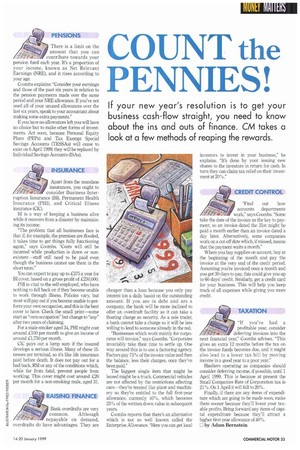COUNT the
Page 35

If you've noticed an error in this article please click here to report it so we can fix it.
PENNIES!
if your new year's resolution is to get your business cash-flow straight, you need to know about the ins and outs of finance. CM takes a look at a few methods of reaping the rewards.
PENSIONS
There is a limit on the amount that you can contribute towards your pension fund each year. It's a proportion of your income, known as Net Relevant Earnings (NRE), and it rises according to your age.
Coombs explains: "Consider your earnings and those of the past six years in relation to the pension payments made over the same period and your NRE allowance. If you've not used all of your unused allowances over the last six years, speak to your accountant about making some extra payments."
If you have no allowances left you will have no choice but to make other forms of investments. Act soon, because Personal Equity Plans (PEPs) and Tax Exempt Special Savings Accounts (TESSAs) will cease to exist on 6 April 1999; they will be replaced by Individual Savings Accounts (ISAs).
INSURANCE
Apart from the mundane insurances, you ought to consider Business Interruption Insurance (BI), Permanent Health Insurance (PHI), and Critical Illness insurance (CC).
RI is a way of keeping a business alive while it recovers from a disaster by maintaining its income.
"The problem that all businesses face is that if, for example, the premises are flooded, it takes time to get things fully functioning again," says Coombs. "Costs will still be incurred while production is down or nonexistent—staff still need to be paid even though the business cannot use them in the short term."
You can expect to pay up to £375 a year for BI cover, based on a gross profit of c£250,000.
PHI is vital to the self-employed, who have nothing to fall back on if they become unable to work through illness. Policies vary, but most will pay out if you become unable to perform your own occupation, and this is the best cover to have. Check the small print—some start as "own occupation" but change to "any" after two years of claiming.
For a male smoker aged 34, PHI might cost around ,E.100 per month to give an income of around £1,750 per month.
CIC pays out a lump sum if the insured develops a serious illness. Many of these illnesses are terminal, so it's like life insurance paid before death, It does not pay out for a bad back, RS1 or any of the conditions which, while far from fatal, prevent people from working. This cover might cost around ,E20 per month for a non-smoking male, aged 31.
RAISING FINANCE
Bank overdrafts are very common. Although repayable on demand, overdrafts do have advantages. They are cheaper than a loan because you only pay interest (on a daily basis) on the outstanding amount. If you are in debt and are a company, the bank will be more inclined to offer an overdraft facility as it can take a floating charge as security. As a sole trader, a bank cannot take a charge so it will be less willing to lend to someone already in the red.
"Businesses which work mainly for corporates will invoice," says Coombs. "Corporates invariably take their time to settle up. One way around this is to use a factoring agency. Factors pay 75% of the invoice value and then the balance, less their charges, once they've been paid."
The biggest single item that might be leased might be a truck. Commercial vehicles are not affected by the restrictions affecting
cars they're treated like plant and machinery so they're entitled to the full first-year allowance, currently 40%, which becomes 25% of the written down value in subsequent years.
Coombs reports that there's an alternative which is not so well known called the Enterprise Allowance. "Here you can get local investors to invest in your business," he explains. "It's done by your issuing new shares to the investors in return for cash. In turn they can claim tax relief on their investment at 20%."
CREDIT CONTROL
"Find out how accounts departments work," says Coombs. "Some take the date of the invoice as the key to payment, so an invoice dated the 31st might be paid a month earlier than an invoice dated a day later. Alternatively, some companies work on a cut-off date which, if missed, means that the payment waits a month."
Where you buy supplies on account, buy at the beginning of the month and pay the invoice at the very end of the credit period. Assuming you're invoiced once a month and you get 30 days to pay, this could give you up to 60 days' credit. Similarly, get a credit card for your business. This will help you keep track of all expenses while giving you more credit.
TAXATION
"If you've had a profitable year, consider deferring invoices into the next financial year," Coombs advises. "This gives an extra 12 months before the tax on the invoice funds becomes due, and it might also lead to a lower tax bill by moving income in a good year to a poor year."
Hauliers operating as companies should consider deferring income, if possible, until 1 April 1999. This is because at present the Small Companies Rate of Corporation tax is 21%. On 1 April it will fall to 20%.
Finally, if there are any items of expenditure which are going to be made soon, make them sooner because they'll lower your taxable profits. Bring forward any items of capital expenditure because they'll attract a higher first year allowance of 40%.
0 by Adam Bernstein








































































































